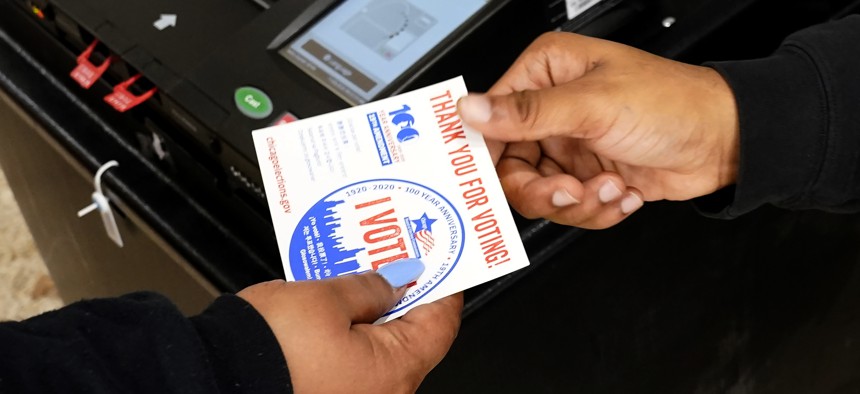Rejecting the ‘Fair Tax’ Ballot Measure, Illinois Voters Decide to Keep a Flat Income Tax

A poll worker hands a voter their "I Voted" sticker on Election Day. AP Photo/Charles Rex Arbogast
Illinois voters rejected a ballot measure that would have allowed the state to implement a graduated income tax. Campaigns for and against the initiative together raised more than $120 million.
Illinois will remain one of only nine states that uses a flat income tax, with voters in the state deciding against a hotly contested proposal that would have transitioned the state to the more common graduated income tax system.
With 74% of votes counted by Wednesday afternoon, it seems the so-called “Fair Tax” ballot measure has been rejected, with 55% of voters saying no.
The rejection of the measure—which prompted about $124 million in campaign donations—is a blow to liberal groups and Democratic Gov. J.B. Pritzker, who argued that a progressive income tax would be more equitable for low and middle income families. It also comes for a state that year after year must deal with budget shortfalls, which the coronavirus pandemic this year pushed to $6.5 billion. Illinois also has one of the worst funded public pension systems in the country.
Quentin Fulks, chair of the Vote Yes for Fairness group, said that Republicans who opposed the proposal “continue to stand in the way of common sense solutions.”
“Illinois is in a massive budget crisis due to years of a tax system that has protected millionaires and billionaires at the expense of our working families, a crisis that was only made worse by the coronavirus pandemic,” he said. “Now lawmakers must address a multi-billion dollar budget gap without the ability to ask the wealthy to pay their fair share. Fair Tax opponents must answer for whatever comes next.”
Illinois Republican Party chairman Tim Schneider congratulated voters for rejecting the tax change in a statement Tuesday night. “With Pritzker Democrats no longer able to use taxpayers to bail them out of our state’s financial disaster...Illinois now has a chance to enact much needed reforms,” he said.
The ballot measure itself did not have the power to impose higher income tax rates on higher earners; instead it gives the state the ability to do so. The state was already prepared to do that—in June of 2019, Pritzker signed a bill that would have allowed for the adoption of a graduated income tax on January 1, 2021 if voters had approved the ballot measure.
That legislation took a “soak the rich” approach, meaning it would only have raised taxes on those making $250,000 or above, representing the top 3% of earners. Illinois currently has a flat income tax rate of 4.95%. That would drop to 4.75% for the state’s lowest earners, and rise to 7.99% for those in the highest tax bracket making $750,000 or above.
The fight over the ballot measure came to be called “the battle of the billionaires” because of the moneyed interests that got involved. The measure had the support of Pritzker, the state’s billionaire governor, who personally contributed $58 million to supporting the ballot initiative’s passage. The opposition campaign was funded largely with a $54 million donation from Kenneth Griffin, founder of the investment firm Citadel. It became the most expensive ballot initiative in state history.
Pritzker argued that wealthy people like him haven’t paid their fair share in the past. “Is it fair that a nurse or a firefighter or a frontline grocery store worker pays the same rate as Ken Griffin or any of the wealthiest people in Illinois?” Pritzker said in an October interview with public radio station WBEZ. “No, that’s not fair.”
Griffin called the proposal “catastrophic” and said the tax system change would mean “the continued exodus of families and businesses, loss of jobs and inevitably higher taxes on everyone.”
Advocacy groups on both sides of the issue made their case on the basis of the state’s already dire fiscal situation.
A graduated income tax system would bring in an estimated $3 billion in tax revenue. In September, Lt. Gov. Juliana Stratton said that if the measure failed, state lawmakers might have to balance the budget by raising taxes on everyone “by at least 20% regardless of their level of income,” something she said would “only serve to deepen the dramatic inequities that we already see across the state.”
Opponents of the measure, including the Illinois Republican Party and the state Chamber of Commerce, said it would drive wealthy people and businesses from Illinois into neighboring states with lower taxes. Mark Grant, the Illinois state director for the National Federation of Independent Business, said that the tax brackets from the 2019 law wouldn’t last forever—and that could cause uncertainty for small businesses.
“There’s a real concern that the General Assembly will continue to pass tax increases in the coming years so they can keep spending on new programs without fixing the deficit,” he said in July. “Small business owners understand that the General Assembly has to address Illinois’ financial calamity but raising taxes without making major spending reforms won’t make things better.”
The measure’s supporters, including the Illinois Demcratic Party and progressive organizing groups like Indivisible, said that the state’s financial woes were in part due to a tax system that is out of sync with the rest of the country, as 32 other states employ a progressive income tax.
Ralph Martire, executive director of the Center for Tax and Budget Accountability, in a September op-ed wrote that Illinois had the “most unfair, regressive tax systems in America” that “worsen[ed] the significant growth in income inequality that's occurred over the last 40 years” and “exacerbate[d] the economic harm wreaked by the pandemic.”
Emma Coleman is the assistant editor for Route Fifty.
NEXT STORY: Judge Rules Cities’ Muni Bond Rate-Fixing Lawsuit Against Big Banks Can Proceed






